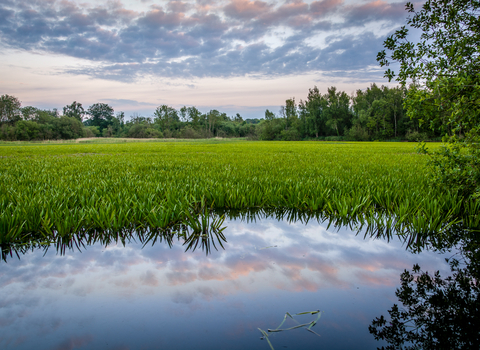21 nature organisations are calling for urgent measures to help lift England’s rivers, lakes and streams from the bottom of the water quality league table, and warn that drastic action is needed to restore wildlife habitat. Every freshwater body in England currently fails chemical standards and only 16% are classed in good ecological health compared to 53% on average in the EU.
A new report launched today by Wildlife and Countryside Link’s Blueprint for Water group, warns that climate change is worsening conditions for our already beleaguered waters. Increased water-use during droughts and damage caused by flooding, which are both becoming more frequent due to climate change, are compounding the existing problems of overuse and chemical, sewage and plastic pollution for our waters.
Wildlife is struggling to survive, our rivers are not safe to swim and play in
Ali Morse, Water Policy Manager at The Wildlife Trusts, and Chair of Blueprint for Water, said: “Nature and society are already paying the price for the over-use and pollution of our waters and wetlands - wildlife is struggling to survive, our rivers are not safe to swim and play in, and as customers we pay millions to clean up water so that it’s safe to drink. And that price is going to get even steeper as we feel the effects of climate change.
“We’re facing a hazardous future of water shortages, flood damage and the loss of iconic species like the water vole and Atlantic salmon in England. We should all be worried that none of our rivers, lakes or streams are in good health and we have among the worst water quality in Europe. It’s time for a new vision for English waters, with adequate investment, robust pollution prevention and sustainable water use.”
Tom Fewins from the Wildfowl & Wetlands Trust (WWT) said: “The world faces a biodiversity crisis. In the UK alone, over half of freshwater and wetland species are declining with 13% at risk of extinction. Poor water quality is helping to fuel this and the UK is very likely to miss its targets to address this. We must urgently turn this situation around – and that should include looking to the ‘nature based solutions’ that wetlands provide. This includes their amazing ability to improve water quality by filtering out a wide range of pollutants, something WWT has found out over the many years we have been creating ‘treatment’ wetlands specifically for this purpose. With a biodiversity crisis upon us the Government must now adopt wetlands as a powerful weapon in the fight to restore our missing wildlife. This means putting together the partnerships, information, plans and funding in place to create and restore 100,000ha wetlands as part of a Blue Recovery.”
Tony Gent, CEO of Amphibian and Reptile Conservation, said: “Our freshwater wildlife is declining with almost a third of British amphibians and reptiles seriously threatened. Healthy waters are vital to wildlife survival, community wellbeing and business success. Yet the health of our ponds, rivers, and wetlands are continually overlooked, under-protected and under-invested in. It’s vital that we reset the balance for our waters.”
Freshwater in England faces a huge number of threats and challenges. These include: flood and drought damage; overuse by agriculture, other industries and households; pollution from sewage, farm run-off, chemicals, pesticides, and plastics; and invasive species which clog our waterways and outcompete or prey on natural wildlife. All of this has led to a crisis for freshwater and wetland habitats of all shapes and sizes, and the wildlife that relies on them.
There have been some positive recent moves on freshwater issues within Government. These include significant funding for multiple nature-based flood-prevention schemes and action on sewage pollution, with notable welcome amendments (spear-headed by Rt Hon Philip Dunne MP) made to the Environment Bill. But recent relaxations of the rules relating to storm overflows that could allow additional pollution from water companies and farmers are a concern.[5] And with raw sewage pouring into our rivers and seas for 3.1million hours last year, record numbers of flood warnings and drought-related low groundwater levels in recent years, and the failure of all English freshwater against chemical standards, radical action is needed to help turn our rivers crystal clear and clean.
The report published today will be launched at an event featuring water quality campaigners, Chair of the Environmental Audit Committee Philip Dunne MP, Shadow Natural Environment Minister Olivia Blake MP and Lord Chidgey. The report poses three main challenges for the Government:
- RESTORE water and wildlife through large-scale, strategic habitat restoration, protecting and enhancing wildlife hotspots such as our internationally valuable chalk streams.
- CLEAN-UP pollution with an effective and fully resourced monitoring and enforcement regime, driven by ambitious targets. This should include: stricter checks on chemical pollutants; stronger rules and penalties so that the ‘polluter pays’, support to help farmers reduce pesticide and agri-chemical reliance; new drainage measures to reduce sewage overflows; and greater investment of fines into habitat restoration.
- RE-THINK our relationship with water to build a sustainable system, delivering climate resilience, water security, and health and well-being benefits for our communities. This would include measures such as compulsory water-metering to reduce consumption, increased investment in nature-based solutions to help tackle climate change-related flood-risk, and increased local authority restoration of urban ‘blue spaces’ for public and nature benefits.

